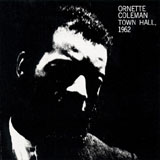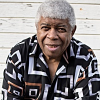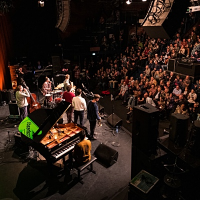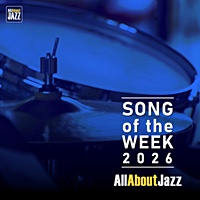Home » Jazz Articles » Ornette Coleman
Jazz Articles about Ornette Coleman
Ornette Coleman: Ornette Coleman Town Hall, 1962

by Lyn Horton
Ornette Coleman's theory of harmolodics set a standard for improvised music that is unrivaled. Coleman closed the synaptic gap between the conception and implementation of the musical idea so that spawning the music became a conjugation of the harmonic relationships that live within it.
The ESP-Disk re-release of Ornette Coleman Town Hall, 1962 brings the music so close to the experience that the performers seem to be just yards away. The sad fact remains that this is only part of ...
Continue ReadingOrnette Coleman: To Whom Who Keeps a Record

by Kurt Gottschalk
In principle, copies of the Beauty is a Rare Thing (Atlantic, 1992) box set should be issued with every voter registration card; no home is complete without the collection of Ornette Coleman's prodigious 1959-1961 output. A gathering of the six albums released during that time, three later albums culled from those sessions and alternate takes, it is a crucial document of American art. One of those three later albums, To Whom Who Keeps a Record was released ...
Continue ReadingOrnette Coleman at the Skopje Jazz Festival, Macedonia

by Nenad Georgievski
Ornette Coleman Skopje Jazz Festival Skopje, Republic of Macedonia October 23, 2006
Each year the Skopje Jazz Festival manages to top itself. Whatever featured lineup gathers under the cover of the event's large umbrella, it always manages to surpass the previous year. The pattern has continued for the last 24 years, and this year's event, which included a celebration of the festival's 25-year existence, was no exception. Over these two and one-half decades ...
Continue ReadingOrnette Coleman: Sound Catalyst

by Clifford Allen
Catalyst (n.)--an agent that facilitates a change.Catalysis (n.)--the action or effect of a substance in increasing the rate of a reaction without itself being consumed. --Shorter Oxford English DictionaryWhile change occurs all around, the agent stands apart, its own dynamism existing somewhere askance from the rest of the world. Though Picasso had a huge influence on several areas of abstract art-making, his own oeuvre stood well outside trends and new developments. In American music, figures like ...
Continue ReadingOrnette Coleman: Sound Grammar

by Clifford Allen
It's been a decade since the last bounty of Ornette recordings. 1995-96 saw releases from his free-funk mélange Prime Time; a robust quartet with pianist Geri Allen and bassist Charnett Moffett; and duets with pianist Joachim Kühn, a German free music architect. Indeed, the past three decades have seen an inordinate amount of change for Coleman's groups, and though the fundamentals of his music may remain basically untouched, their aesthetic presence and reach seemed, for a while, to be apples ...
Continue ReadingOrnette Coleman: Sound Grammar

by AAJ Italy Staff
Di fronte a quello che in genere - forse troppo spesso - viene definito ‘evento discografico’ sarebbe sempre bene mantenere un certo distacco. Diffidare delle roboanti presentazioni, per non rischiare di appiattire il proprio ascolto su piani tracciati da altri per altri meno nobili scopi. Perché di ‘evento discografico’ indubbiamente qui si tratta. Una nuova registrazione a dieci anni dalla precedente; una nuova formazione (la cui formula in realtà era già stata sperimentata sul finire degli anni ’60); nuove composizioni ...
Continue ReadingOrnette Coleman: Sound Grammar

by Dan McClenaghan
In the beginning of free jazz, there was Ornette Coleman. Actually, the alto saxophonist was the beginning of free jazz. His 1959 Atlantic recording The Shape of Jazz to Come followed on the heels of a couple of innovative smaller label outings that didn't make a splash at the time. Many musicians have followed Coleman down the path of freedom, but none have equaled him.Sound Grammar is his first CD release in ten years. His last studio efforts, ...
Continue Reading


















